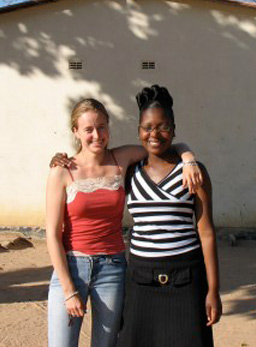Not many elementary school assemblies receive rave reviews from students. But this was exactly where Jennifer Kyker first experienced the Zimbabwean music that would forever shape her life. Kyker, who this spring completed her Ph.D. in ethnomusicology, was smitten.
“I immediately ran up and got the group's number,” she says. “I brought it home to my mom and said, ‘You have to call these people, so I can start taking lessons.’ Soon, I was convincing my parents to let me travel to study music in Zimbabwe. I was only 15 at the time, but it was one of the best experiences of my life.”
Kyker's Ph.D. focuses on popular Zimbabwean musician Oliver Mtukudzi. She examines the ways in which he uses song to address controversial social issues that would otherwise be stifled by a strict government. The politics of post-colonial Zimbabwe are often viewed as chaotic, Kyker says, but the country's strong roots in kinship power structures have created a complex second layer. “If the government claims they are ‘father’ to the people, when in truth they are ruling in a manner contradictory to that label, then suddenly a song by Mtukudzi about a local village father that abuses his children takes on an entirely new meaning.”
Given her affinity for Zimbabwean music, pursuing it on a scholarly level seemed like a natural evolution to Kyker. During her time as an undergraduate, she received a summer research scholarship to spend time in the field studying Kurova Guva, a musical ceremony held one year after a death in order to reincorporate the spirit into the ancestral lineage. An accomplished performer of Zimbabwean music in her own right, Kyker was even invited to participate.
“The first Zimbabwean instrument I learned to play was the marimba, essentially a wooden xylophone,” she says. “It was developed in the 1950s to create a more accessible type of traditional music for audiences.”
“There was a girl I met when I first started visiting Zimbabwe,” Kyker says, “and we were about the same age, and our lives were following similar paths. I didn't realize at the time how different our futures would be”
– Jennifer Kyker
The marimba came to the U.S. in the 1970s with Ph.D. student Dumisani Maraire. He was one of the first international Ph.D. candidates to travel to the U.S. and earn a degree in ethnomusicology, which ultimately influenced Kyker's decision to choose the program. In addition to the marimba, Kyker also plays the mbira, a wooden soundboard with metal keys played with the thumbs and right index finger.
Throughout her frequent trips to Zimbabwe, Kyker became all too aware of the AIDS epidemic facing the country. “There was a girl I met when I first started visiting Zimbabwe,” Kyker says, “and we were about the same age, and our lives were following similar paths. I didn't realize at the time how different our futures would be. She has lost her parents and nearly all of her relatives to AIDS. She dropped out of school and isn't able to find work.”
She estimates that 10% of the population is now made up of orphaned children. Unwilling to sit idle, Kyker founded the grassroots non-profit organization Tariro, in 2003. Tariro works to stem the spread of HIV/AIDS by educating young women. The organization enables young women who have been orphaned by the virus to complete a secondary school education, thereby dramatically reducing their risk of contracting the disease.
Tariro has grown from an initial budget of $5,000 to $70,000. In addition to a board of directors in Zimbabwe, there is also a full-time coordinator that oversees student development. The organization focuses on orphaned teenage girls because they are most likely to contract the virus. It holds information sessions on prevention safety, as well as fosters a culture of arts with traditional dance and music lessons.
Kyker will be starting as a tenure-track professor at the University of Rochester and Eastman School of Music later this year where she hopes to continue in her quest to spread awareness about music, social justice and culture.



